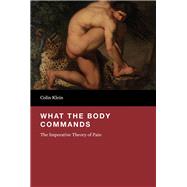In What the Body Commands, Colin Klein proposes and defends a novel theory of pain. Klein argues that pains are imperative; they are sensations with a content, and that content is a command to protect the injured part of the body. He terms this view “imperativism about pain,” and argues that imperativism can account for two puzzling features of pain: its strong motivating power and its uninformative nature. Klein argues that the biological purpose of pain is homeostatic; like hunger and thirst, pain helps solve a challenge to bodily integrity. It does so by motivating you to act in ways that help the body recover. If you obey pain's command, you get better (in ordinary circumstances). He develops his account to handle a variety of pain phenomena and applies it to solve a number of historically puzzling cases. Klein's intent is to defend the imperativist view in a pure form—without requiring pain to represent facts about the world.
Klein presents a model of imperative content showing that intrinsically motivating sensations are best understood as imperatives, and argues that pain belongs to this class. He considers the distinction between pain and suffering; explains how pain motivates; addresses variations among pains; and offers an imperativist account of maladaptive pains, pains that don't appear to hurt, masochism, and why pain feels bad.








